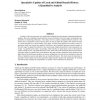Free Online Productivity Tools
i2Speak
i2Symbol
i2OCR
iTex2Img
iWeb2Print
iWeb2Shot
i2Type
iPdf2Split
iPdf2Merge
i2Bopomofo
i2Arabic
i2Style
i2Image
i2PDF
iLatex2Rtf
Sci2ools
JILP
2000
2000
Speculative Updates of Local and Global Branch History: A Quantitative Analysis
In today's wide-issue processors, even small branch-misprediction rates introduce substantial performance penalties. Worse yet, inadequate branch prediction creates a bottleneck at the fetch stage, restricting other opportunities for improving performance. The choice of how to predict conditional-branch outcomes is the primary lever on prediction accuracy. But the choice of when to update the predictor with branch outcomes is a second powerful lever, and the subject of this paper. In history-based predictors like gshare, many mispredictions result from commit-time update of the history: typical pipelined processors predict branches in the fetch stage, but update the predictor in the commit stage, making the predictor's state temporarily outof-date. As pipelines grow longer--in particular, when branches can spend many cycles in the instruction window waiting to issue--this problem becomes worse. Prior work on this subject has discussed the need for speculative update in a glo...
| Added | 19 Dec 2010 |
| Updated | 19 Dec 2010 |
| Type | Journal |
| Year | 2000 |
| Where | JILP |
| Authors | Kevin Skadron, Margaret Martonosi, Douglas W. Clark |
Comments (0)

